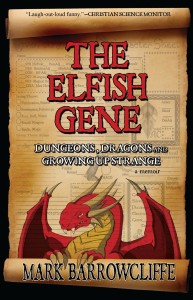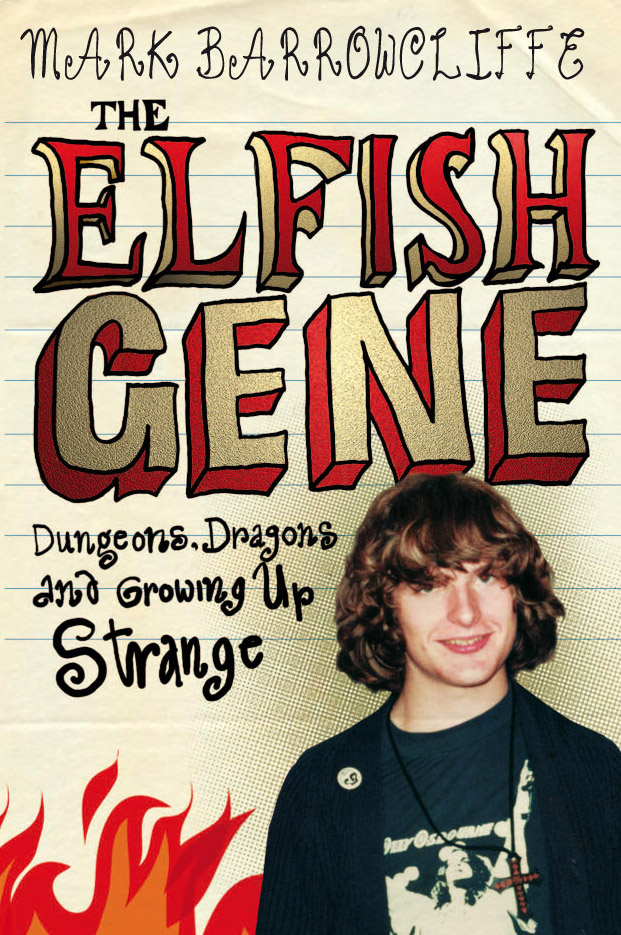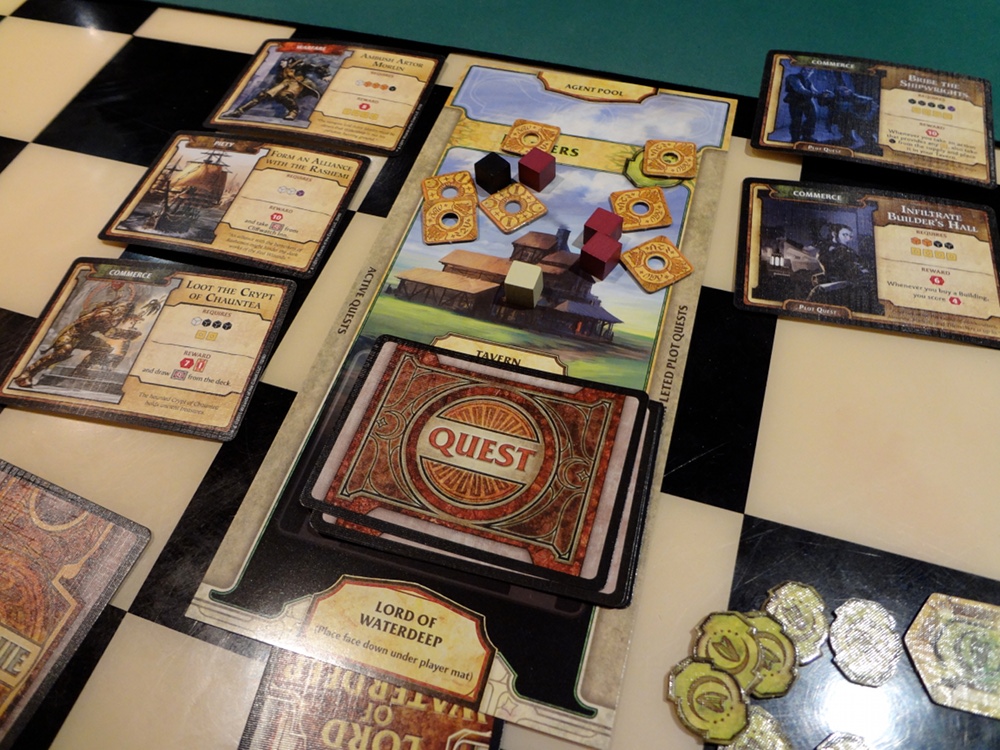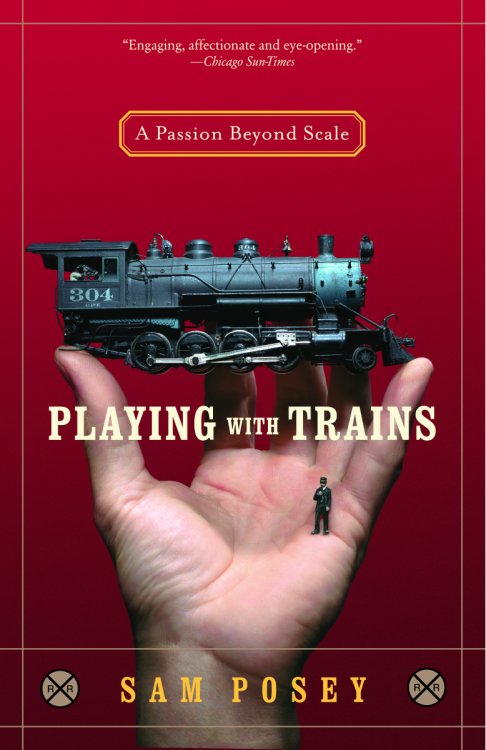The Elfish Gene: Dungeons, Dragons, and Growing Up Strange
 The Elfish Gene: Dungeons, Dragons, and Growing Up Strange by Mark Barrowcliffe is just as much about growing up in Britain in the 1970s as it is about early Dungeons and Dragons and a few other select RPGs. It is also a very quick and entertaining read. Barrowcliffe lays out the premise of his book on the second page, explaining that he lived and breathed RPGs (and fantasy) from the age of eleven to sixteen, followed by twice-a-week sessions until he was twenty. The Elfish Gene captures this impressionable time in his life, as well as how he transitioned out of role-playing. If you are expecting an old timer’s feelings on World of Warcraft or the move from 3.5 to 4th Edition, look elsewhere, but if you enjoy reading about the Arduin Grimoire, the Empire of the Petal Throne, and numerous juvenile D&D arguments, The Elfish Gene is a must-read. The book is also exceptional if you like occasionally poignant films and books about adolescence and an author’s reflections on his youth. If the characters in Stand By Me were D&D players of the 1970s I think you would have something close to Barrowcliffe’s book.
The Elfish Gene: Dungeons, Dragons, and Growing Up Strange by Mark Barrowcliffe is just as much about growing up in Britain in the 1970s as it is about early Dungeons and Dragons and a few other select RPGs. It is also a very quick and entertaining read. Barrowcliffe lays out the premise of his book on the second page, explaining that he lived and breathed RPGs (and fantasy) from the age of eleven to sixteen, followed by twice-a-week sessions until he was twenty. The Elfish Gene captures this impressionable time in his life, as well as how he transitioned out of role-playing. If you are expecting an old timer’s feelings on World of Warcraft or the move from 3.5 to 4th Edition, look elsewhere, but if you enjoy reading about the Arduin Grimoire, the Empire of the Petal Throne, and numerous juvenile D&D arguments, The Elfish Gene is a must-read. The book is also exceptional if you like occasionally poignant films and books about adolescence and an author’s reflections on his youth. If the characters in Stand By Me were D&D players of the 1970s I think you would have something close to Barrowcliffe’s book.
Barrocliffe’s Style
Barrowcliffe’s writing in The Elfish Gene lends itself to the reader imagining and predicting where a particular chapter is headed. When a chapter has a title like “The Gathering of the Clouds”, the reader can imagine what problems might befall the young Barrowcliffe and rain on his life. This is usually a good trait in writing. In most chapters though, Barrowcliffe writes a few paragraphs or pages about a development in his role-playing life, but then meanders off on some side quest explaining a facet of British society in the 70s before the main quest is rejoined. While such delays build anticipation, they can get quite frustrating. Aside from minor issues with him getting to the point though, his style in The Elfish Gene is quite strong with ample explanations of RPG terms when needed and layered references to preceding portions of the memoir. The Elfish Gene is thoroughly engaging, even if the author’s eventual move away from role-playing in university had me shaking my head and left a bitter taste in my mouth. I am grateful though that Barrowcliffe’s departure from RPGs allowed him to pursue a course in journalism and to take up writing, eventually producing this memoir that I have enjoyed so much.
Barrowcliffe’s Humor Gene
Perhaps more importantly than his ability to tell his own tale, Barrowcliffe’s writing is full of humor. No, I didn’t laugh uproariously as I read The Elfish Gene, but I was generally entertained and chuckled through a good portion of it. While he was getting into D&D in 1977 and I first played it in 1989, I immediately recognized a number of his gamers as familiar from my own junior high friends. The personalities of gamers have not really changed in the intervening twelve years – or even thirty – and Barrowcliffe brings these personalities across with humor, even if a character only persists for a few paragraphs. There’s the overly-literal, argumentative characters who make such perceptive statements as “Football is for morons and thugs … Superior people play Dungeons and Dragons.” There is the loquacious DM Steve who introduces a Strider-like character, “His cloak is of motley, and his breeks are spattered with the mud of a hundred journeys. Tall if he, and imposing of stature, though he sits unassumingly. Perhaps you might not remark him on first glance until your gaze lingers a little longer and you see the burning coals that are his eyes!“. Then there is the frustratingly brief Dave who is always “A man in a cloak.” Barrowcliffe doesn’t spare himself though. In fact, he’s the main source of humor. His pride in obtaining the nickname of Spaz is just the start of his social obliviousness that pops up again and again throughout The Elfish Gene.
This ignorance and boorishness make for some of the best moments of his memoir, which I was dying to share with my wife. Almost every role-playing layman he meets is subjected to interrogations on Dungeons & Dragons and Barrowcliffe’s evangelism for the gaming hobby that consumed his life. When he writes that “I knew far more about the wants and needs of a golden dragon than I ever did a girl,” Barrowcliffe goes on to demonstrate that with example after embarrassing example. When presented with the chance to go to second base with an older girl at the age of 11, Barrowcliffe instead expands on D&D’s appeal, “Look. It’s the best and most sophisticated wargame ever devised”. Incredibly, he doesn’t drive her away and a humorous exchange about her Charisma score of 6 ensues. This sets the stage for later encounters. When first visiting a proper game store, Barrowcliffe introduces himself to the proprietor thusly:
‘I’m Spaz Barrowcliffe,’ I said, ‘I called you earlier on. D&D magic-user level 25, EPT priest level 4,’ (Billy was a bit of a martinet when it came to seeing the rules were followed) Traveller marine with a pretty good platform of skills, if I say so myself.’
…
‘I know what you’re thinking,’ I said. ‘Elves can’t go beyond ninth level as magic-users, so why have I got one of twenty-fifth level? In one word, “Wish spells.”‘
The owner is understandably non-plussed and a bit confused and the boys later speculate that the shop owner plays a “Fiftieth-level human cleric, no races… probably with the Mace of Cuthbert and some other one-off magical items. I wouldn’t have thought he’d be overly laden down with potions. Invisibility maybe, but he’d have CLW and CSW as spells so he’d more than likely trade them in for something more magic usery.” The book abounds with such humorous encounters and I found most of them to be on the light-hearted end of the spectrum. Barrowcliffe reserves most of any negativity or venom for himself, but again, he is also the most comical character in the memoir.
Further Thoughts on the Elfish Gene
The Elfish Gene is quite meaty and also surprisingly thought-provoking for a book about RPGs in the 1970s. I know that I will be returning to it for his insights on RPGs, gamers, and gaming, but the following immediately stuck out to me about the book.
The Pursuit of the Supernatural and the Occult
By the time I got into D&D, there were still murmurs of charges alleging ties from RPGs to Satanism and the occult in Dragon Magazine’s Forum section and in letters to its editors, but I had missed most of the furor of the 1980s. Barrowcliffe ironically was one of those players who actually was trying to cast spells and summon demons. As he writes, “When I say I thought I could be a wizard, that’s exactly true. I really did believe I had latent magical powers, and, with enough concentration and fiddling my fingers into strange patterns, I might suddenly find how to unlock the magic inside me.” Barrowcliffe was inspired by Ursula Le Guin’s A Wizard of Earthsea and his own desire for untold untapped power hiding within him. While I have to confess to still trying to move things telekinetically from time to time, Barrowcliffe really went a lot further with humorous results as he tries to perform a magic ritual in an English graveyard with his aptly-named friend Rat, who once tried to summon Cthulhu. As Barrowcliffe surmises, “Summoning Cthulhu is roughly the same as trying to summon Peter Pan.” Instead, Barrowcliffe attempts a Golden Dawn ceremony after studying Aleister Crowley’s teachings and having experimented with magic mushrooms. As he demonstrates though (and Rat too), there are a number of role-players who try to tap into the supernatural. Whether they really proportionately exceed other children or adolescents trying to do the same, is a matter for further research. In Barrowcliffe’s view on his obsessive interest, “D&D didn’t encourage my leanings towards trying magic of my own at all. In fact, it frustrated them.” He argues that instead D&D gave him a more stimulating outlet for his interests, but this doesn’t quite explain why he persisted in trying to cast spells as he got older.
British Politics and Class System
I think students of classism and domestic British socio-politics of the 1970s would benefit from a read of The Elfish Gene due to Barrowcliffe’s anecdotes and observations. Aside from the role-playing and coming of age aspects, class and politics really make up the rest of the book and were a huge part of Barrowcliffe’s teenage reality. Soccer or football might get a line or two, but there are pages and pages on socialism, communism, and fascism. Barrowcliffe grew up working class and later flaunts it when he arrives at university and his classmates long for any sort of street cred. Earlier though, his Nazi-admiring gamer friends who are pretentious and think of themselves as upper class get a firm reminder that they are instead very much working class and are merely being pretentious twats. I do think this third element of the book might turn off other American readers or be a bit incomprehensible, but in saying that I might be the pretentious twat.
Further Readings and Games to Explore
While I do plan on rereading The Elfish Gene again, it has also opened up other books to explore, starting with Barrowcliffe’s other novels. I did read through the first several chapters of Girlfriend 44 before abandoning it and didn’t even make it that far into Infidelity for First-Time Fathers before quitting it too. Deprived of references to RPGs and fantasy, his characters are just too nasty, mundane, and British for my tastes, but I will be trying Lucky Dog as well as his M.D. Lachan books. As he explained in his April interview on this site, M.D. Lachan is Barrowcliffe’s fantasy pen name for a historical fantasy series involving werewolf Vikings. He also has a similarly historical fantasy series forthcoming under the pen name Mark Alder about the Hundred Years’ War.
Elric looms so huge in The Elfish Gene and was such a massive inspiration for Barrowcliffe’s RPG characters, campaigns, and world settings that I will have to read Michael Moorcock. Similarly I now want to read Le Guin’s Earthsea series to see what the fuss is all about too. Then there is Empire of the Petal Throne (EPT). While the vast, vast majority of The Elfish Gene is about D&D, maybe ten to fifteen percent is about EPT, created by linguistics professor M.A.R. Barker. In one very entertaining chapter of the book, Barrowcliffe and GM friend Billy play through a session of EPT while Barrowcliffe’s parents watch a quiz show. As Barrowcliffe characteristically explains EPT to a London shopkeeper as an adult, it’s “The original role–playing game,’ I said, ‘published just after D&D in 1975, though after Chainmail. You have heard of Chainmail? First available through the Owl and Weasel fanzine, precursor of White Dwarf?'” Barrowcliffe celebrates EPT for its novelty and linguistic and economical detail, including its own language and the chlen pack animal whose hide forms the basis of game’s economy.
Barrowcliffe’s Supportive Friends and Family
Earlier I mentioned that the book could be the Stand by Me of 1970s English D&D players. While there is no dead boy by the train tracks, The Elfish Gene has its share of emotional moments and friendships being strained and reaffirmed. Barrowcliffe’s parents appear from time to time and when he is exiled from his D&D group by the older boys, it is Mrs. Barrowcliffe that makes her son a Kermit the Frog stuffed animal which he later uses as a lizardman which he names Krrrllkccr and it is Mrs. Barrowcliffe who finds her son a new wargames club to join. They rather tolerantly allow their son to host 20+ gamers for Saturday gaming with an evening’s notice, which has his mom baking 60 scones and making sandwiches to host them. Other tolerant parents also appear including Billy’s father, an avowed fascist and gun collector with a live hand grenade in his collection. Billy himself is a larger than life character, both literally and figuratively and the loss of his friendship is keenly felt both by Barrowcliffe and the reader. For all the gamers in Barrowcliffe’s life, RPGs were an outlet to be something other than what they were at the time (just as RPGs are now), but the gamers’ friends and family also allowed their obnoxious loved ones to have some respite from the real world to even be able to explore their imaginations. Like some of my friends in junior high (and perhaps myself), Barrowcliffe was particularly obnoxious. It says a lot that his family and friends were supportive and nurturing enough to see him through to less obnoxious times.



Pingback:Friday Knight News - Gaming Edition: 15-JUN-2012 | Game Knight Reviews